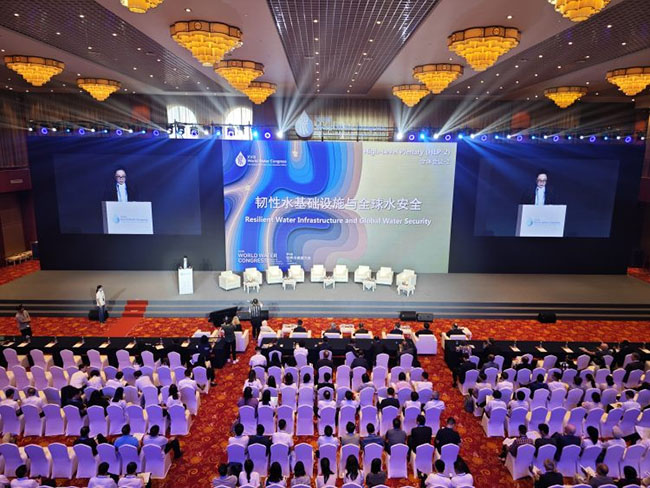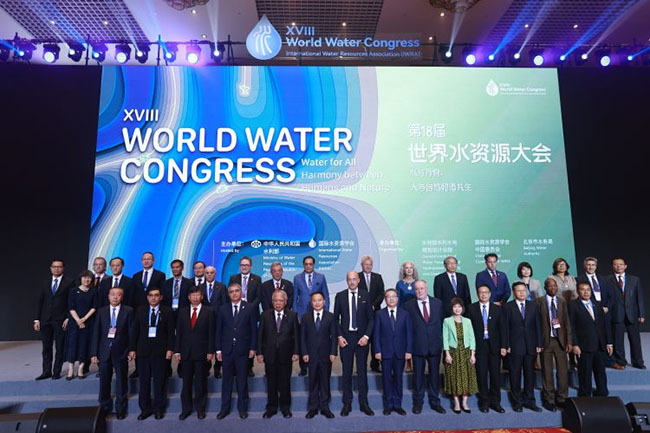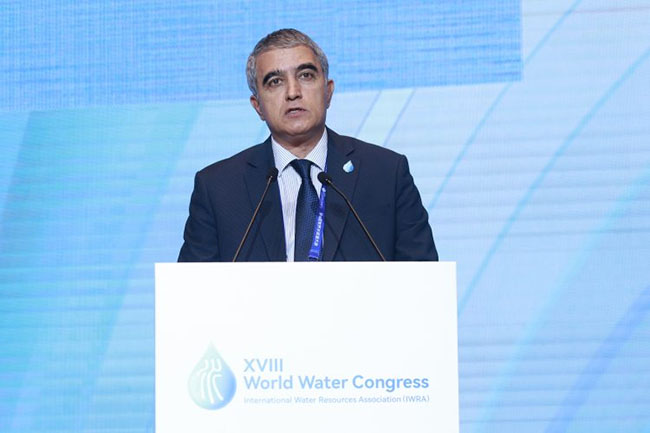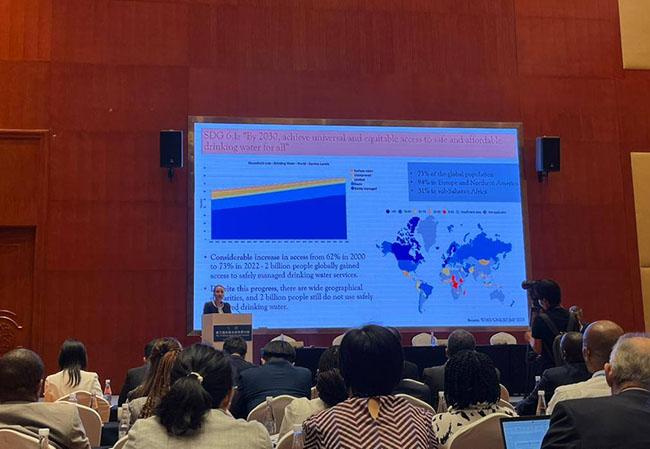THE XVIII WORLD WATER CONGRESS
“WATER FOR ALL: HARMONY BETWEEN HUMANS AND NATURE”
The XVIII World Water Congress was held in Beijing on September 11-15, 2023.

The Congress was organized by the International Water Resources Association (IWRA) and the Ministry of Water Resources of the People’s Republic of China.
The objective of the World Water Congress is to provide a meeting place to share experiences, promote discussion, and to present new knowledge, research results and new developments in the field of water sciences around the world. For almost five decades, the World Water Congresses have been excellent events for the identification of major global themes concerning the water agenda, and for the bringing together a wide range of stakeholders for the development and implementation of water solutions.
XVIII World Water Congress dedicated to the theme “Water for all: Harmony between Humans and Nature” aimed to promote coordination and balance between the water needs of humans and nature. The Congress will facilitate knowledge and experience sharing, focusing on investigating the relationship between water, humans and nature, identifying and reconciling all water-related factors in a coordinated manner, and making and implementing water management strategies and policies using systematic approaches.
The Congress was organized around 6 sub-themes:
- Water-human-economy (agriculture, industry, city…)-ecology nexus under a changing environment;
- Promoting water efficiency, productivity and services;
- Building resilience for disaster prevention and mitigation;
- Supporting aquatic ecosystem health and functions;
- Establishing sustainable water infrastructures;
- Innovation for water governance and management.


The Minister of Water Management of the Republic of Uzbekistan, Sh. R. Khamraev, attended the World Water Congress on behalf of Central Asian countries and delivered a welcoming speech at the opening ceremony. He informed the participants about priority directions of water sector development, the tasks defined in the Concept for the development of water management sector of the Republic of Uzbekistan for 2020-2030 and their implementation, effective management and rational use of water resources, water conservation, and introduction of digital technologies on a large scale. The work in the field of bilateral and multilateral improvement of good-neighborly relations with the countries of the region, joint management of transboundary water resources, use of interstate canals and water facilities has been carried out by Uzbekistan.

Dr. Dinara Ziganshina, SIC ICWC Director, took part in the World Water Congress. She made a report on "Guaranteeing basic human rights - ensuring access to safe drinking water for all" at the 3rd Global Water Security seminar.

Key messages of the first day XVIII World Water Congress (September 11)
Key reports and sessions were focused on nature-based solutions, i.e. measures address social issues while ensuring both human well-being and benefits for nature. It is suggested that water should not be seen as a sector or capital but as an institutional principle for linking SDGs, climate change action and biodiversity conservation.
With the current progress of implementation, the global community will not be able to achieve the Sustainable Development Goals on water (SDG 6) by 2030. The UN-Water coordination of SDG 6 Global Acceleration Framework has identified five "accelerators" that can assist countries in their efforts:
- Governance - strengthening cross-sectoral coordination and transboundary water cooperation, clearly defined roles and responsibilities of all stakeholders, effective and inclusive institutions.
- Financing shall be increased dramatically on the part of public and private sectors, and donors, water suppliers shall improve efficiency and effectiveness to ensure optimal use of funds, and governments shall provide a stable and transparent administrative, regulatory and policy environment that encourages investment. This provides a quantifiable positive return on investment in water supply at the expense of medical cost savings and increase in efficiency that makes 3 USD per dollar invested in urban basic drinking water, and from 7 USD in rural basic drinking water.
- Capacity development: comprehensive human and institutional capacities at all levels.
- Data and information: building trust by collecting, verifying, standardizing and sharing data for decision-making.
- Innovation: application and expanding innovative practices and technologies.
A new report of the World Water Council “Opening up Integrated Water Resource Management to include Energy, Food, Health and Education” has been presented. Levers for implementing this updated vision include: (a) technological solutions, (b) regulation and incentives, (c) education and raising awareness for behavior change.
Innovative forms of financing by attracting the public and private sectors. For example, Washington has issued 5-year "water" bonds to strengthen the existing infrastructure with natural solutions for flood control and water quality improvement. California has launched a specialized bank that sells loans to meet measures for climate change mitigation on marshes.
Urbanization and climate change exacerbate both water scarcity. A key aspect of urbanization is that urban planning has not kept pace with population growth and rural-to-urban migration. Planning, budgets and infrastructure are failing to provide water and sanitation to most urban residents in developing countries, contributing to poor health and high pollution of wastewater.
|